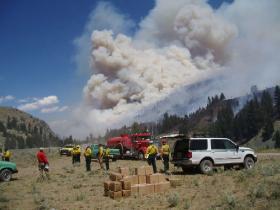Environment News Service (ENS)
Competing Thirsts Squeeze Dry Western States
By J.R. Pegg
WASHINGTON, DC, March 10, 2004 (ENS) -
Western states bracing for another dry, hot
summer need to recognize a fundamental shift
in the contentious debate over water supplies,
a top Interior Department official said on
Tuesday.
The drought stricken region now faces the
"potential for crisis in normal conditions,"
according to Interior Assistant Secretary for
Water and Science Bennett Raley.
The Western water disputes of the last century
were largely limited to times of drought or
focused on long term control of the resource,
Raley told the Senate Energy and Natural
Resources Committee.
That has changed, and the debate is no longer
driven by drought, he said.
The continued population growth of the West,
combined with the demands of agriculture and
conservation, "guarantee that without action
today we will have crises in normal years,"
Raley warned.
Many in the West would welcome a normal year,
but there are few signs one is around the
corner.
The interior West is suffering from a multiyear
drought that began in 1999, according to Dr.
Louis Uccellini, director of the National Center
for Environmental Prediction at the National
Weather Service.
Uccellini told the committee the current drought
is one of the worst the West has seen in the
past 40 to 100 years.
He said a return to more normal snowfall this
winter will provide some relief - snow
contributes some 50 percent to 80 percent of the
region's water supply.
But accumulated long term deficits remain large
in many areas - in particular in the Southwest.
The majority of reservoirs in Nevada, New
Mexico, Utah and Arizona are at 50 percent or
below normal levels, he told the committee, and
changing climate patterns could increase
pressure on the arid region in the future.
"We see a warming trend over several decades for
much of interior West and expect it to
continue," Uccellini said.
And the population and economic growth that is
adding pressure to the situation raises the
stakes for all involved, Raley said.
 Interior Assistant Secretary for Water and
Science Bennett Raley.
(Photo courtesy
U.S. Geological Survey)
Interior Assistant Secretary for Water and
Science Bennett Raley.
(Photo courtesy
U.S. Geological Survey)
Future water supply shortages, Raley said, will
cause economic harm in the West that will ripple
throughout the national and international
economies.
"We no longer have the luxury to debate for
decades to come," Raley said.
The issue presents a daunting test for elected
officials, who must balance the competing
thirsts of urban residents, agricultural and
recreational interests, along with the needs of
the region's power plants and its fish and
wildlife.
"I do not even know where to begin to describe
the vast challenges faced by states like mine,"
said Committee Chairman Pete Domenici, a New
Mexico Republican. "The need is astronomical,
pervasive and persistent."
Domenici said many rural Western communities are
struggling with the resources to fund the
allocation of clean water and the treatment of
wastewater.
"Things are literally falling apart," he said.
"I keep reading that the government wants to
help but everything I see is too miniscule for
the size of the problem … we can no longer put
off our federal responsibility."
But the federal response to drought has been
poorly coordinated because responsibilities are
scattered across the federal government, said
Craig Bell, executive director of the Western
States Water Council, which consists of
representatives from 18 Western states and is a
product of the Western Governors Association.
The federal government has given Western states
broad authority with regards to water, but
several federal agencies play pivotal - and
often competing - roles in allocating the finite
supply in the West.
In addition, federal agencies combined spend
some $6 billion to $8 billion a year on drought.
Bell called for the Congress to pass the Drought
Preparedness Act of 2003, which would put in
place a comprehensive national drought policy
and authorize a lead federal agency for drought,
delineating the roles and responsibilities for
coordinating and integrating federal assistance
for droughts.
"That would get us away from this ad-hoc
fragmented approach to drought," Bell said. "It
would help us manage water in the West more
effectively and efficiently."
Bell said Western states are also keen for the
federal government to provide better information
about water resources, weather trends and future
climate shifts that could further reduce the
area's water supply.
"We lack info about vital [factors] that affect
drought and impact the West," Bell said. "We
need better information."

Drought is a major contributor to the wildfires
that have ravaged the
West in the past decade.
(Photo courtesy
Forest Service)
A key focus for the Bush administration, Raley
said, is its Water 2025 Initiative, which it
unveiled last year as a plan to prevent water
crises and conflicts in the West.
The program calls for concentrating existing
federal financial and technical resources in key
western watersheds and in critical research and
development efforts that will help to predict,
prevent and alleviate water supply conflicts.
The grant program focuses on "things we know we
can do on the ground to make a difference,"
Raley said.
For the short term, the Bush administration is
"most worried" about the water challenges in the
Middle Rio Grande and the Klamath River Basins,
Raley said, and plans to focus its Water 2025
program at these areas.
Recent crises in both basins have pitted
farmers, urban residents, Native American tribes
and wildlife against one another - each
demanding a share of the scarce water supply -
situations that have been made more contentious
by sustained drought.
The administration has proposed $21 million in
grants through the 2025 Initiative to develop
conservation, efficiency and water marketing
projects. Critics say the total is far too small
to help create long term solutions to these
water disputes.
+++++++++++++++++++++++++++++++++++++++++++++++++++++++++++
NOTE: In accordance with Title 17 U.S.C. section
107, any copyrighted
material herein is distributed without profit
or payment to those who have
expressed a prior interest in receiving this
information for non-profit
research and educational purposes only. For
more information go to:
http://www.law.cornell.edu/uscode/17/107.shtml
|

